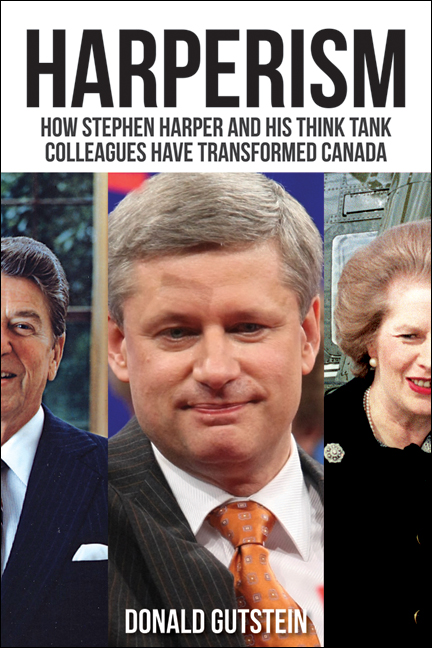Harperism
How Stephen Harper and his think tank colleagues have transformed Canada
by Donald Gutstein
The thinkers and ideas that brough Reaganism and Thatcherism to Canada today
Margaret Thatcher transformed British political life forever. So did Ronald Reagan in the United States. Now Canada has experienced a similar, dramatic shift to a new kind of politics, which author Donald Gustein terms Harperism. Among its key tenets:
- A weakened labour movement--and preferably the disappearance of unions--will contribute to Canada's economic prosperity
- Cutting back government scientific research and data collection will improve public policy-making
- Eliminating First Nations reserves by converting them to private property will improve conditions of life for aboriginal peoples
- Inequality of incomes and wealth is a good thing--and Canada needs more of it
These and other essential elements of Harperism flow from neo-liberal economic theories propounded by the Austrian economist Friedrich von Hayek and his U.S. disciples. They inspired Thatcherism and Reaganism. Stephen Harper has taken this neo-liberalism much further in many key areas. As Donald Gutstein shows, Harper has successfully used a strategy of incremental change coupled with denial of the underlying neo-liberal analysis that explains these hard-to-understand measures.
The success of Harperism is no accident. Donald Gutstein documents the links between the politicians, think tanks, journalists, academics, and researchers who nurture and promote each other's neo-liberal ideas. They do so using funds provided by ultra-rich U.S. donors, by Canadian billionaires like Peter Munk, and by many big corporations--all of whom stand to gain from the ideas and policies the Harperites develop and push.
This book casts new light on the last ten years of Canadian politics. It documents the challenges that Harperism--with or without Stephen Harper--will continue to offer to the many Canadians who do not share this pro-market world view.






